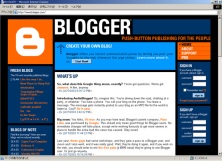 Our class assignment this week was to choose a blog that interested us and analyze the functions and substances of the blog as a form of writing and information delivery.
Our class assignment this week was to choose a blog that interested us and analyze the functions and substances of the blog as a form of writing and information delivery.
JONATHAN KATROWITZ – ARIZONA EDUCATION REPORT
As someone who has worked in public education in Arizona for 25 years, the issues currently facing education in our state are of great interest to me. The blog I have chosen to analyze is “Arizona Education Report”.
Arizona Education Report is written by Jonathan Kantrowitz, according to his eBlogger bio, blogs on a wide variety of topics ranging from venture capitalism, bad knees, restaurants in New Haven County, and another blog on education, “Education Research Report.” The wide variety of blog subjects and the fact that Kantrowitz includes zero information about what he does for a living or his educational background leaves me to be less than confident in being a credible and knowledgeable expert in the topic which first drew me to his blogging – education in Arizona.
The Blog Rubric for this class outlines the following critical elements for the blogs we write for class. I believe that they are an appropriate barometer for evaluating blogs we read on the Internet:
- Critical Thinking & Reflection – Support your claims with examples of personal experience, learning or a logical thought process.
- Integration and Application – Integrate concepts from the content. I translate this as “know what you’re writing about.” And, prove it.
- Voice – Write in a voice appropriate for the audience and use a consistent voice.
- Articulation of Response – Write in an organized manner, use proper grammar, and cite your sources.
Looking at the first item – Critical Thinking and Reflection – I turn to a quote from an article by William Kraska. According to Kraska, “blogs become successful because of specificity and passion.” Kraska also recommends that bloggers have “a single focus about a topic you really enjoy, and put a little of yourself into it.” The variety of subjects on which Kantrowitz writes suggest that he blogs about things that interest him at the moment, not a particular issue that he is passionate about.
Looking at the blogs posted, the author also does not appear to be writing from personal experience or knowledge. Instead, he seems to be summarizing information he’s gotten from another source. While he may include a hyperlink to a source, he does not include a list of references.
 HOW DOES MY BLOG COMPARE?
HOW DOES MY BLOG COMPARE?
When I realized that blogging was a requirement for this course, I starting biting my nails. My writing credits are limited to Facebook posts, articles for a newsletter and weekly eblast for the middle school where I’ve worked and a personal – never to see the light of day – journal.
I would rate my blogs so far as a solid effort, but certainly not something that will suck people in and bring them back for more. I hit the standards of including personal experience and logical thought process. I write in an organized manner and cite my sources.
It’s finding my voice and writing style that I struggle with. Perhaps that is because I am writing about assigned topics as opposed to something I truly feel passionate about.
FOLLOWING A BLOGGERS CODE OF CONDUCT
First of all, I’d like to see a better definition of what a blog is. My first choice was to analyze “Clean Mama.” However, as I began analyzing the website/blog, I realized that the main purpose was to sell products created by the author. When does a “blog” cross over into being an advertisement for products being sold?
I’d also like to see some sort of disclaimer about the authority and credibility of the author. I have a friend who writes a blog about her personal experiences as she researches her family history. The sharing of her journey as she peels back the layers of her family is incredibly interesting reading (She would have killed me if I’d chosen to use her blog to analyze…but I wish you could read it!). But, she is telling her personal story. Therefore, I don’t think adhering to an Ethics for Bloggers is necessary.
as she peels back the layers of her family is incredibly interesting reading (She would have killed me if I’d chosen to use her blog to analyze…but I wish you could read it!). But, she is telling her personal story. Therefore, I don’t think adhering to an Ethics for Bloggers is necessary.
However, if you are presenting yourself as an authority on a subject, I believe there should be a code of ethics and bloggers should follow it. Your blog should not be personal opinion.
References:
Kraska, W. (Spring 2005). What makes a good blog? In This is not a Blog. Retrieved August 28, 2015, from http://journalism.nyu.edu/publishing/archives/notablog/story/good_blog/.